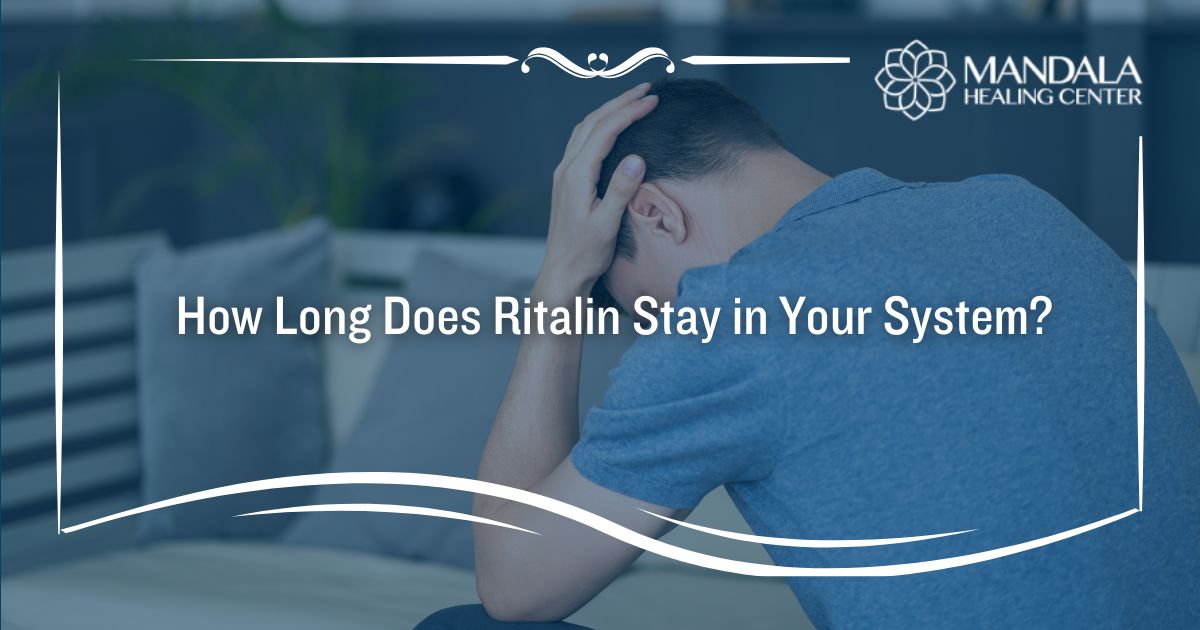Ritalin is a central nervous system stimulant that is used to treat attention deficit hyperactivity disorder (ADHD) and narcolepsy.[1] It contains methylphenidate which boosts the levels of dopamine and norepinephrine in your brain. While Ritalin is effective in treating conditions like ADHD, it can be habit-forming and addictive.
According to the U.S. Department of Justice (DOJ), 4% of high school seniors abused Ritalin at least once.[2]
If you or a loved one abuse Ritalin, you might be wondering how long it stays in your system. The half-life is around 3.5 hours, which means it is eliminated from the body within 18 hours.[3] That said, drug tests have a longer detection window because the drug leaves behind metabolites in different areas of your body.
The Mandala Healing Center is here to offer evidence-based treatments for Ritalin addiction. If you or a loved one struggles with Ritalin abuse, we can help you begin a new way of life.
In this article, you will learn:
- What is the half-life of Ritalin
- How long will you test positive for Ritalin
- Can Ritalin cause a false positive for amphetamines
What is the Half-Life of Ritalin?
The drug methylphenidate is available by prescription to treat narcolepsy and ADHD. If you are abusing it, you might be wondering how long it will remain in your body. To understand this, you have to know what a drug’s half-life is.
A half-life explains how long it takes your system to eliminate half of a drug’s dose. It can take 4 to 5 half-lives for a drug to be removed from your body.
Keeping this in mind, the half-life of Ritalin is around 3.5 hours.[3] In other words, Ritalin will stay in your system for up to 18 hours after your last dose.
It is important to note that many factors play a role in how long Ritalin stays in your system. For example, taking extended-release formulations might mean it stays in your body longer. Additionally, your age, weight, body fat percentage, and overall health can affect how quickly your body eliminates Ritalin.
How Long Can Drug Tests Detect Ritalin?
Ritalin is not an amphetamine, which means it will not show up on a 5-panel drug test. Specialized tests must be used to detect methylphenidate. Keeping this in mind, there are some circumstances where you might be drug tested for Ritalin.
How long Ritalin is detectable on a drug screen depends on the type of test being used. For example, hair follicle tests will detect Ritalin for a longer period than urine, saliva, or blood tests.
Urine
Urine tests are the most commonly used type of test because they are minimally invasive and relatively cheap to obtain. You might be asked to complete a urine drug test before receiving a job, during rehab, or in a parole office.
Drug tests can detect Ritalin in urine for 1 to 3 days after your last dose.
Blood
Blood tests are not used as frequently as urine tests because they are invasive and offer a shorter window of detection. However, they might be preferred in hospital settings to determine if a substance is contributing to your symptoms. Blood tests can detect Ritalin for 12 to 24 hours after your last dose.
Saliva
Saliva tests tend to be unreliable because most substances leave your saliva rather quickly. That said, they tend to be effective for Ritalin testing. Saliva tests can find Ritalin in your system for 1 to 3 days after you last used it.
Hair
Hair tests are not preferred because they are expensive to analyze and often cause unreliable results due to hair color discrimination. Despite this, some high-security clearance jobs still use them for their long detection times. Hair follicle tests can detect any substance, including Ritalin, for 90 days after your last dose.
Will Ritalin Cause a False Positive for Amphetamines?
Ritalin is not an amphetamine drug, which means you should be safe to take it even if you have to pass a 5-panel drug test. Additionally, most places will excuse a positive result if you have a prescription for the medication that you tested positive for.
With that being said, Ritalin can cause a false positive for amphetamines. This can occur when there is a high concentration of Ritalin in your system.[4] To explain, you might test positive for amphetamines if you are consuming high doses of Ritalin frequently.
If you or a loved one is struggling with Ritalin abuse, you should seek professional help. Long-term Ritalin addiction can lead to psychological issues, long-term health effects, and even life-threatening overdoses. Whether you began using it to treat a mental health condition or simply to experience a high, Mandala Healing Center can help you regain control over your life.
Finding Help for Ritalin Abuse and Addiction
Ritalin is a stimulant medication that can lead to addiction when abused. If you or a loved one is having a hard time controlling how much Ritalin you consume, you are probably suffering from a substance use disorder. Other signs of addiction include experiencing cravings, tolerance, or withdrawal symptoms.
While Ritalin addiction can be difficult to overcome, the Mandala Healing Center is here to help. We offer evidence-based treatments for addiction, like medical detox, behavioral therapies, and relapse prevention planning. Our addiction specialists also use a compassionate approach to addiction treatment that makes it easy for you to open up about your struggles.
Contact the Mandala Healing Center today to learn more about our Ritalin addiction treatment center. We will create an individualized treatment plan that addresses all of your needs for recovery and a better life.
References:
- Medline Plus: Methylphenidate
- The U.S. Department of Justice (DOJ): Ritalin Fast Facts
- The Food and Drug Administration (FDA): Ritalin Label
- Lippincott Journals: Does methylphenidate cause a false positive result on amphetamine drug screening tests in patients on maintenance methylphenidate?












